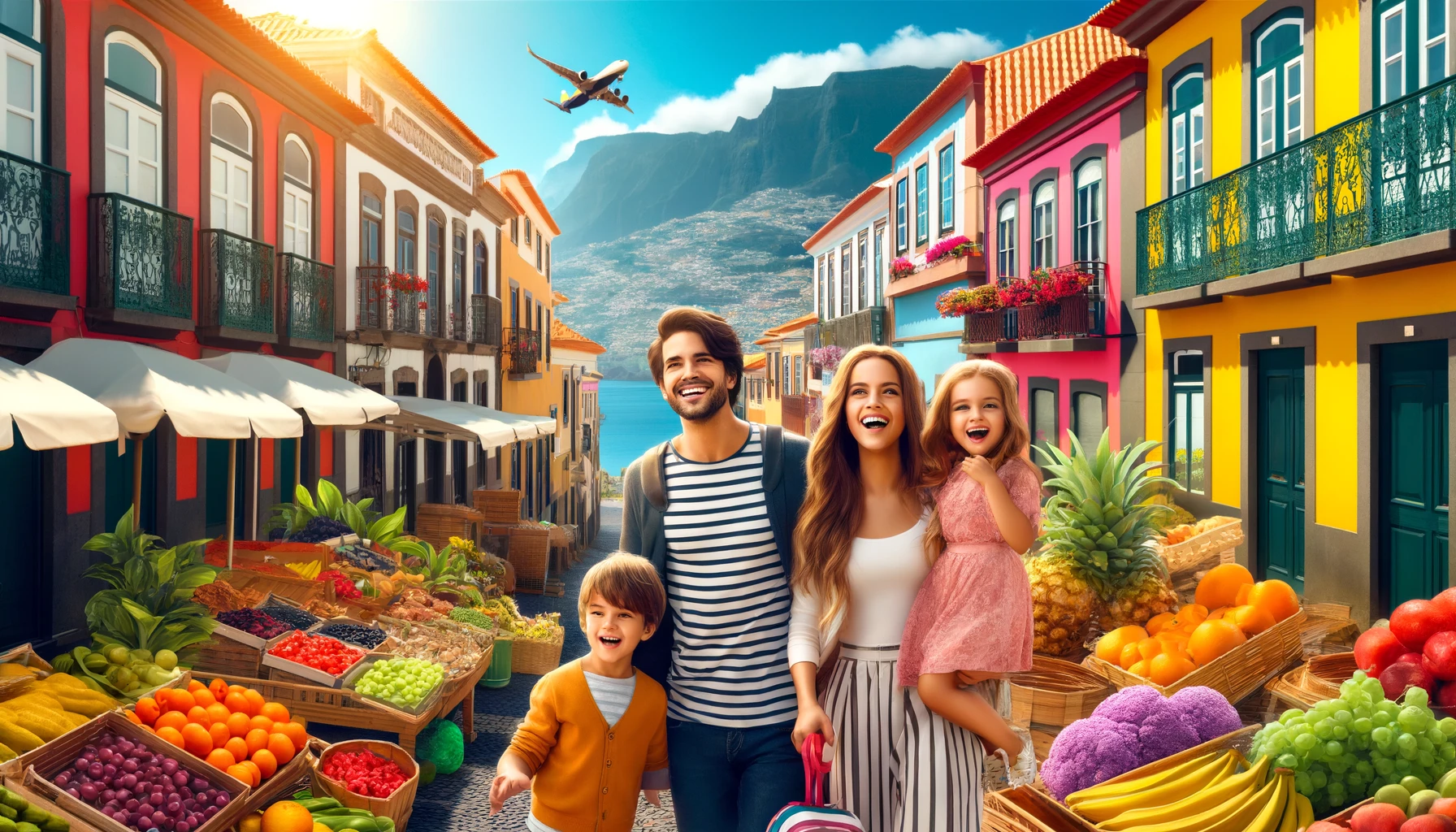Madeira, Portugal, stands out as an illustrious hidden gem nestled within the European Union, offering a sanctuary for those looking to emigrate. Renowned for its mild climate, the island boasts an alluring average temperature range of 19°C in winter to 26°C in summer, complemented by approximately six hours of sunshine daily. This Portuguese island, part of the Madeira archipelago, is characterized by its diverse landscape featuring cliffs, mountains, and panoramic views, which together create a tranquil yet vibrant living environment. Living in Madeira presents an unparalleled opportunity to experience a variety of microclimates, from the cooler mountainous regions to the warmer, sun-soaked southern shores.
Emigration to Madeira promises an enriched lifestyle amidst natural beauty, safety, and tranquillity, with little traffic to mar its serenity. The island’s community is noted for its deep religious roots and unique linguistic heritage, enhancing the cultural experience of residing in Madeira. For nature tourism enthusiasts, Madeira Island offers activities such as hiking, snorkelling, and golfing, among others. This article delves into essential insights for thriving on this island, covering visa and documentation requirements, finding a home, financial planning, and adapting to the distinct joy of living in Madeira.
Visa and Documentation Requirements
Navigating the visa and documentation requirements to emigrate to Madeira is a crucial step for anyone considering relocating to Madeira. The process varies significantly depending on one’s nationality and the intended duration of stay. Here, we outline the essential visas and permits and the necessary documentation to ensure a smooth transition to life in Madeira.
Golden Visa Changes and Alternatives
The Portuguese Golden Visa program has recently undergone changes, notably excluding domestic property investments from qualifying asset classes. Potential investors can now look towards alternatives such as infrastructure or farming funds to fulfil the investment criteria necessary for the Golden Visa.
D7 Visa: The Passive Income Route
The D7 Visa, often called the retirement visa, is tailored for individuals with a passive income of at least €10,000 annually. Applicants must demonstrate their financial stability and commit to becoming a taxpayer in Madeira to qualify for this visa. This option is particularly popular among retirees seeking to enjoy Madeira’s serene lifestyle.
Essential Documentation for Residency
To reside and work in Madeira, expatriates must possess a valid passport and obtain a residence permit. The type of permit required can vary, encompassing options for investment, self-employment, or general work purposes. Key documents necessary for application include:
- Proof of income or financial stability
- Comprehensive health insurance coverage
- A clean criminal record from the country of origin
Health Insurance and Legal Documentation
Securing health insurance coverage is mandatory for accessing healthcare services in Madeira. It is advisable to research and finalize private health insurance plans before arrival. Additionally, non-EU/EEA/Swiss citizens must ensure they have the appropriate work permits and legal documentation in place before they start the process to emigrate to Madeira.
EU, EEA, and Swiss Nationals
Citizens from the EU, EEA, and Switzerland enjoy the privilege of visa-free access to live and work in Madeira. However, they must still register and obtain a certificate of registration upon arrival for stays longer than three months.
Non-EU/EEA/Swiss Citizens’ Requirements
Individuals outside the EU/EEA/Swiss regions must apply for a D7 Visa or Golden Visa through the Portuguese Consulate or Embassy in their home country. It is crucial to review the tax implications related to relocation and obtain a Portuguese Tax Number (NIF) for all tax-related matters in Portugal.
Consulting Professional Advice
Given the complexities of immigration laws and the recent changes in policies, consulting with an immigration lawyer or a professional advisor is highly recommended. This ensures compliance with all legal requirements and a smoother transition to life in Madeira.
By carefully preparing and understanding the visa and documentation requirements, potential expatriates can ensure a successful relocation to Madeira, Portugal’s hidden gem.
Finding a Place to Live
Popular Expat Communities and Housing Costs
Madeira offers a variety of living options for those looking to emigrate to Madeira, catering to different preferences and budgets. Most expatriates choose to reside in Funchal or Câmara de Lobos due to their vibrant communities and comprehensive amenities. Caniço and Santa Cruz are also favoured for their expat-friendly environments. The cost of housing is relatively lower compared to the mainland, with long-term rental prices varying by area and property type:
- T1 (one-bedroom apartment): €500 – €650 per month
- T2 (two-bedroom apartment): €650 – €850 per month
- T3 (three-bedroom apartment): €750 – €1000 per month
Rental Options and Platforms
For those looking to find long-term rentals, several platforms and resources are available:
- Online Platforms: Idealista, Imovirtual, and Net-Bairro offer extensive listings across various property types.
- Social Media and Local Groups: Facebook Marketplace and groups like Madeira Expat Community can be great for finding private rental deals.
- Real Estate Agencies: Madeira Legacy, Futuro Real Estate and KW provide professional services with added security and assistance in dealing with rental agreements.
Advantages and Disadvantages of Rental Options
Renting from a private owner often results in lower prices and direct communication, which can facilitate negotiations. However, potential drawbacks include less formal rental agreements and difficulties in official registrations. Conversely, using a real estate agency, while slightly more expensive, ensures a formal contract, safeguarding deposits and regular payments.
Understanding Local Rental Laws
It is essential for potential renters to understand that local laws mandate a written contract for all long-term rentals, with a minimum duration of 12 months. This protects both the tenant and landlord and clarifies terms such as rent amount, payment schedules, and the obligations of each party.
Property Types and Prices
Madeira’s real estate market is diverse, offering apartments, villas, townhouses, and traditional Quintas. While rent prices in Funchal range from €400 to €800 for a one-bedroom apartment, more affordable options can be found in Ponta do Sol, Porto Moniz, and Camara de Lobos. Conversely, Funchal and Calheta are among the pricier areas.
Final Considerations Before Leasing
Before committing to a property, visiting Madeira to explore different areas and understand the local lifestyle is advisable. This allows potential residents to assess factors like proximity to work, public transportation, and local amenities, ensuring a choice that best fits their needs and preferences.
Cost of Living and Financial Planning
Living in Madeira offers a cost-effective alternative to many Western European locations, with overall expenses being approximately 25% cheaper than in German-speaking countries. This affordability extends across various aspects of daily life, from housing to groceries, making Madeira an attractive destination for expatriates and retirees.
Overview of Daily Expenses
Housing and Accommodation Costs
Madeira’s real estate market presents a range of options for both renters and buyers. While rental prices have been previously discussed, purchasing property offers competitive rates compared to mainland Portugal. For instance, a 2-bedroom apartment in Funchal is priced around €170,000, significantly lower than in Lisbon where the same could cost about €220,000. This trend holds for larger properties as well, with 4-bedroom houses in Funchal available for around €500,000, a stark contrast to Lisbon’s €700,000.
Utility and Grocery Prices
Utility costs in Madeira are generally lower than those in mainland Portugal, with an average monthly expense for utilities, including Wi-Fi and mobile data, coming to about €62 as of January 2023. Grocery prices are also favourable; a comprehensive monthly shopping for groceries could average around €401, providing an economical option for residents.
Transportation and Miscellaneous Costs
Transportation
The island’s transportation system is efficient and affordable. A single bus ticket costs between €2 and €4, while a monthly pass is priced at about €40. For those preferring personal transport, renting a car can start from €30 per day.
Leisure and Entertainment
Madeira offers numerous reasonably priced dining and entertainment options. The average cost for a meal at a restaurant is around €20 per person, and engaging in local activities like guided tours may cost about €150. For those looking to integrate into the local lifestyle, coworking spaces are available at approximately €130 per month.
Financial Planning for Expatriates
Budgeting for Living Expenses
Prospective residents should consider a total monthly budget starting from €2000 to cover all basic living expenses including rent, which is typically the largest expense. For families, this estimate increases to around €2,689 per month, while single individuals might manage with around €1,198.
Tax Benefits and Business Environment
Madeira not only offers a lower cost of living but also provides favourable business conditions. The Madeira International Business Centre (MIBC) regime offers a reduced corporate tax rate and exemptions from withholding tax on dividends, making it an appealing site for business investments. Additionally, the overall business environment benefits from various tax incentives and benefits, aiding both startups and established enterprises.
Summary of Key Costs in Madeira (January 2023)
Expense Category | Cost (€) |
|---|---|
Utilities (monthly) | 62 |
Groceries (monthly) | 401 |
Dining Out (monthly) | 315.17 |
Transportation (monthly) | 127 |
Gym and Streaming Services (monthly) | 68 |
Miscellaneous Expenses (monthly) | 468 |
Total Monthly Expenses | 2143 |
This financial overview provides a detailed insight into the cost-effective lifestyle available in Madeira, combining affordable living with high-quality amenities and a supportive environment for both personal and professional growth.
Adjusting to Life in Madeira
Embracing the Local Lifestyle
Adjusting to life in Madeira involves embracing the local lifestyle, which is characterized by a relaxed pace and a strong sense of community. The island’s warm climate and 300 days of sunshine a year provide an inviting atmosphere for outdoor activities and social gatherings.
Transportation and Mobility
Public and Private Transport Options
While public transport in Madeira primarily consists of buses, taxis and Uber services provide additional options, especially in areas like Funchal. For those residing in or visiting Porto Santo, it’s important to note that such services are limited. Renting a car is highly recommended for exploring the island’s scenic routes and ensures mobility independence.
Healthcare and Education
Comprehensive Healthcare System
Madeira boasts a robust healthcare system with 47 health centres, public hospitals, and private clinics, ensuring residents have access to quality medical care. The SESARAM public health service, supplemented by private healthcare options, offers comprehensive coverage catering to various health needs.
Educational Institutions
The island caters to educational needs through various institutions, including international schools, bilingual schools, and public schools. International schools offer curricula aligned with global standards and a multicultural environment, beneficial for expat children. However, public schools primarily follow the Portuguese curriculum, which might present language barriers for non-Portuguese speakers.
Community Integration
Engaging with Local and Expat Communities
Joining local clubs, associations, and interest groups is an excellent way for newcomers to integrate into the community. Madeira’s vibrant expat community is welcoming, with numerous social activities and cultural events that provide opportunities to connect with both expats and locals.
Language and Cultural Immersion
Learning Portuguese is crucial for full integration into Madeiran society. Participating in local events and activities not only helps in language acquisition but also in understanding and appreciating local customs and traditions if you decide to emigrate to Madeira.
Professional Opportunities and Networking
Job Opportunities and Business Environment
Madeira offers opportunities primarily in tourism, finance, and international business. Networking and building professional connections are essential for uncovering job opportunities. For those interested in entrepreneurship, consulting with local business advisors or lawyers, such as ourselves, can provide insights into starting a business in Madeira’s favourable economic climate, a reason as to why many decide to emigrate to Madeira.
Safety and Preparedness
Ensuring Personal Safety
Madeira is known for its low crime rates, providing a safe living environment. However, it is advisable for residents to exercise caution, have appropriate health and travel insurance, and familiarize themselves with local emergency services numbers to ensure safety and preparedness in all situations.
By understanding and adapting to these aspects of Madeiran life, expatriates can enjoy a high standard of living and an excellent quality of life, making the most of what this beautiful island offers.
Exploring and Enjoying Madeira
Madeira, often likened to Hawaii for its stunning landscapes and mild climate, offers many activities and attractions that cater to a diverse range of interests—from the adventurous soul to the culture enthusiast. Here’s a guide to making the most of this enchanting island.
Discovering Madeira’s Natural Beauty through Levadas
The island’s unique levadas, historic irrigation channels, now serve as pathways weaving through the scenic landscapes. These trails offer an intimate glimpse into the island’s lush vegetation and diverse ecosystems. Hiking along these routes not only provides physical exercise but also a peaceful retreat into nature’s embrace.
Funchal: A Cultural and Culinary Hub
Funchal, the bustling capital, is a treasure trove of cultural heritage and gastronomic delights. Key attractions include:
- Historical Landmarks: Visit colonial buildings and historic churches that echo the rich past of the island.
- Local Cuisine: Indulge in the flavours of Madeira, where traditional dishes meet African and Mediterranean influences.
- Beaches and Leisure: Enjoy sun-soaked afternoons at local beaches or explore vibrant marketplaces.
Celebrating Tradition and Culture
Madeira’s cultural calendar is dotted with festivals like the Festa da Flor (Flower Festival), where streets come alive with flowers, parades, and traditional music and dance. Engaging in these festivities offers a deeper understanding and appreciation of the island’s community and traditions.
Thrilling Outdoor Adventures
For thrill-seekers, Madeira does not disappoint. Opportunities for canyoning, paragliding, and mountain biking abound, with organized tours available for all skill levels. These activities not only challenge the adventurous but also provide unique vantage points to view the island’s breathtaking topography.
Laurissilva Forest: A UNESCO World Heritage Site
Explore the ancient Laurissilva Forest, a verdant expanse of endemic species and a testament to the island’s ecological significance. This site is a must-visit for nature lovers and environmental enthusiasts alike and will help you decide whether to emigrate to Madeira.
Practical Tips for Island Exploration
Navigating Madeira involves choosing the right mode of transportation to match your travel style and comfort needs. Here are four recommended strategies:
- Rent a Car: Ideal for those comfortable with challenging roads, offering freedom to explore at one’s own pace.
- Taxi or Private Driver: Suitable for those preferring a guided experience without the hassle of driving.
- Organized Tours: Perfect for those who enjoy group travel and detailed insights into the attractions.
- Public Transport: A budget-friendly option, though limited to main routes and schedules.
Staying in Madeira
Choosing the right accommodation can significantly enhance your stay:
- Funchal: Offers a variety of dining, shopping, and entertainment options. Ideal for first-time visitors.
- Multiple Locations: For longer stays, consider splitting your time between different towns to experience the island’s diversity.
When to Visit
To avoid crowds, steer clear of peak holiday seasons. The best times to visit are:
- Spring (April-May): Ideal for hiking and flower enthusiasts.
- Summer (June-September): Best for sunny weather and beach activities.
Packing Essentials
To fully enjoy Madeira’s offerings, pack strategically:
- Outdoor Gear: Include hiking shoes, a rain jacket, and a day backpack.
- Beach and Leisure: Bring swimsuits, flip-flops, and sun protection.
- Photography Equipment: Capture stunning views with a good camera and waterproof cases.
Exploring Madeira is an enriching experience that promises a blend of adventure, culture, and relaxation amid breathtaking natural settings. Whether you’re hiking through ancient forests, tasting local delicacies, or celebrating vibrant festivals, Madeira offers a myriad of activities to suit every traveller and will certainly help you decide to emigrate to Madeira.
Conclusion
Through this comprehensive journey on how to emigrate to Madeira, we’ve explored the essential aspects of emigrating to Madeira, from navigating visa and documentation requirements to the joys of integrating into local life and culture. Insights into the financial practicalities, coupled with tips for finding a place to live, have underscored Madeira’s appeal as a cost-effective destination with a quality of life that balances tranquillity with vibrant cultural experiences. The island indeed offers a unique setting for expatriates, boasting an environment where safety, community, and the enjoyment of nature’s bounty converge to create a truly enriching living experience.
As we consider the transition to life on this beautiful island, it’s clear that Madeira harbours are potential not only for a serene lifestyle but also for personal and professional growth. The opportunities for adventure, cultural immersion, and the formation of lasting connections within the community highlight the island’s capacity to welcome and enchant newcomers. For those contemplating a new chapter in Madeira, the path forward promises discovery, fulfilment, and a deep connection with one of Portugal’s most precious gems.
FAQs
What is the most picturesque village to visit in Madeira?
Ponta do Sol stands out as the most picturesque village in Madeira, known for its charming pastel-coloured buildings and beautiful pebble beach. It’s also recognized as the sunniest spot on the island, making it an ideal location to watch the sunset.
Where do most foreign residents choose to live in Madeira?
Funchal is the preferred home for many expatriates and digital nomads in Madeira, where English is commonly spoken. As the island’s capital with a population exceeding 100,000, Funchal offers a vibrant nightlife, exceptional dining options, and many cultural activities.
How do Madeira and the Azores compare in terms of travel experiences?
Madeira, often called the “Pearl of the Atlantic,” is renowned for its scenic drives through coastal and mountainous landscapes. In contrast, the Azores are celebrated for their breathtaking volcanic craters, hot springs, and dramatic shorelines, offering a unique and captivating driving experience. Visiting both Autonomous Regions will help you decide whether to emigrate to Madeira.
Is a 10-day stay in Madeira considered too lengthy?
A stay of at least a week to 10 days is recommended to immerse yourself in all that Madeira has to offer before deciding to emigrate to Madeira.
The founding of Madeira Corporate Services dates back to 1996. MCS started as a corporate service provider in the Madeira International Business Center and rapidly became a leading management company… Read more




